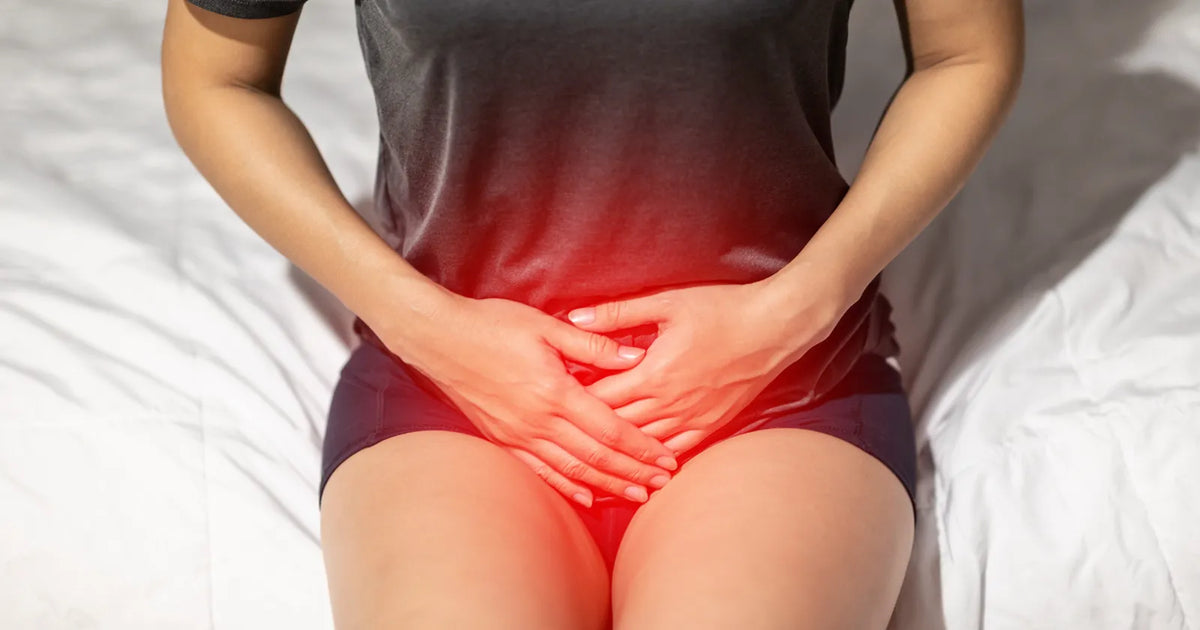
Common Causes of Vaginal Pain & How to Decrease Sensitivity Naturally
|
|
Time to read 4 min
|
|
Time to read 4 min
Sensitivity in our bodies, particularly in our intimate areas, can be both a blessing and a curse. It can lead to enjoyable sensations, but at times, excessive sensitivity can lead to discomfort or pain. This is particularly true for women, as the female genitalia, including the vagina and clitoris, can sometimes be overly sensitive. If you're wondering "why is my vagina sensitive?" and how to decrease sensitivity naturally then this guide is for you.
TL;DR
Before we delve into how to decrease vaginal sensitivity naturally, it's essential to have a clear understanding of the female anatomy. The female genitalia consists of the vagina, which is the internal anatomy that connects the uterus to the vulva, the outer part of the female genitals. The vulva encompasses the clitoris, inner and outer lips (labia), urethral opening, and vaginal opening.
The clitoris is particularly noteworthy because of its high concentration of nerve endings, making it incredibly sensitive. It's the source of a unique, intense pleasure, but can also be a source of discomfort if overly sensitive.
Sensitivity varies greatly from person to person. Some women experience high sensitivity, leading to discomfort or pain during sex and masturbation, while others may feel inadequate sensitivity, leading to difficulties with sexual arousal. Both ends of the spectrum can be problematic, affecting one's quality of life and sexual wellness.
Recommended Reading: How to Increase Female Sensitivity
Numerous factors can lead to vaginal sensitivity. The most common cause is infection, such as a yeast infection or sexually transmitted infections (STIs) like gonorrhea or chlamydia. Other potential causes include trauma from sex, childbirth, surgery, vaginal dryness, or other medical procedures, hormonal changes due to menopause or lack of sexual arousal, and psychological conditions such as a history of sexual abuse.
In some cases, the cause of vaginal pain might remain unknown, termed as vulvodynia - a condition depicting chronic vaginal pain with no known cause.
The clitoris, with its abundance of nerve endings, is one of the most sensitive parts of the female body. This sensitivity can lead to intense pleasure but can also cause discomfort or pain if overly sensitive.
Women new to clitoral stimulation or occasional users of vibrators might experience over-sensitivity even from light, gentle touch due to the firing of numerous nerve endings. This is a completely normal response.
The first step in decreasing sensitivity naturally is understanding and embracing your body's unique reactions. If you're using a vibrator or other form of sexual stimulation and find it too intense, consider adding a layer of fabric between the device and your clitoris. This can be as simple as leaving your underwear on during play or using a soft cloth.
Experimenting with different pressures, speeds, and positions can also help manage sensitivity. Using the same technique can lead to over-sensitivity when other areas are stimulated. Most vibrators and sex toys offer a variety of settings, so don't be afraid to explore and find what works best for you.
If you're experiencing sensitivity during sexual activities with a partner, communication is key. Let them know how you're feeling and what you need. This should be a fun exploration, not a stressful task.
Always remember to be open and honest with your partner. Communication is key when it comes to exploring new sexual activities and fantasies. Moreover, try to keep things light and fun.
Another tip is to set the mood. Light candles, play some music, and create a romantic and intimate atmosphere.
Finally, don't be afraid to experiment and try new things. These games are meant to be a fun and exciting way to explore each other's desires and fantasies, so don't be afraid to step out of your comfort zone.
While natural methods can be effective in managing sensitivity, don't hesitate to seek medical help if the sensitivity continues or worsens. Persistent sensitivity or pain could be a sign of underlying health issues that need to be addressed.
While the focus of this guide is on how to decrease sensitivity naturally, it's worth noting that certain medications may also be helpful. For instance, topical anesthetics or oral medications may be prescribed by your doctor to manage excessive sensitivity.
Various home remedies and over-the-counter treatments can provide relief from vaginal pain. For instance, applying witch hazel pads to your vaginal area may soothe irritation. Over-the-counter antihistamines may also help alleviate vaginal itching.
Supplements like calcium citrate can help reduce urinary tract symptoms that contribute to vaginal pain. However, before taking any supplements or making significant changes to your diet, consult with your doctor.
Excessive sensitivity, whether in the vagina or clitoris, can be challenging to manage. However, by understanding your body, exploring different techniques, and seeking professional help when needed, you can learn how to decrease sensitivity naturally. Remember, there's no need to suffer in silence. Help and support are available, and you have the power to improve your sexual wellness and quality of life.

